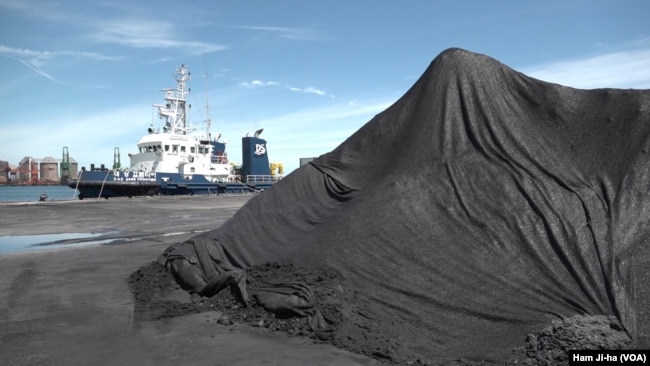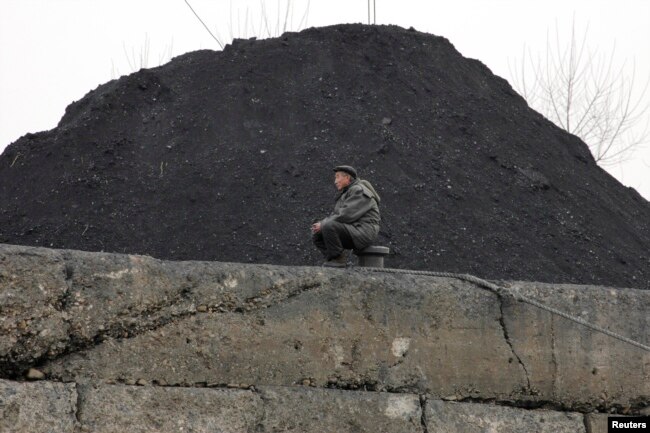Indonesia has released seized North Korean coal in apparent violation of U.N. sanctions, posing a challenge to U.S.-led international efforts to crack down on Pyongyang’s sanctions evasion, according U.N.monitors and court documents, VOA news reports.
The North Korean vessel Wise Honest, owned by Korea Songi Shipping Co. of Pyongyang, set sail toward Indonesia after loading about $3 million worth of coal from North Korean Nampo Port in March 2018. Indonesia detained the ship the next month when it entered the country’s territorial waters without turning on its identification transponder or obtaining clearance from its port of destination, a U.N. Security Council report said in March.
The vessel was sailing under Sierra Leonean and North Korean flags, with registrations from both countries. The ship captain, Kim Chung Son of North Korea, was charged with using a false flag.
U.N. sanctions monitors “informed Indonesia [and Indonesian brokers who were involved in the transshipment of the coal] that the 26,500 tons of coal [on the Wise Honest] should be seized according to the [U.N.] resolutions and that the brokers may not see the coal,” the U.N. report said.
In 2017, the Security Council passed resolutions banning North Korea from exporting coal, one of its most valuable export commodities, and conducting ship-to-ship transfers of goods.
Permission to sell coal
According to court documents that VOA Korean service obtained, the Indonesian Balikpapan District Court, the district where the vessel was ordered to remain anchored, last November allowed Indonesian broker Eko Setyamoko to sell the coal as he requested.
The documents showed that the coal was initially confiscated temporarily as evidence until a judge ruled on its status.
When considering the release of the coal to be sold, the court cited the Certification of Origin issued by Russia, which stated the coal as Russian and Setyamoko as its owner.
But according to the U.N., the coal was loaded from a North Korean port.
The court dismissed charges against the ship’s captain and returned to coal to Setyamoko in February 2019. Afterward, coal was transferred to another ship, the Dong Thanh, owned by a Vietnamese company and sailing under a Panamanian flag.
The Dong Thanh left Indonesia in April, but Malaysian authorities later interdicted it, ordering it not to leave Malaysian territorial waters while investigations were underway.
Before the ship reached Malaysian waters, Malaysian authorities said there were “clear instructions from our government regarding matters involving [North Korea]. … As for the vessel, she will be directed to anchor … upon arrival” while investigations proceeded.
‘Active investigation’
Hugh Griffith, coordinator of the U.N. Panel of Experts on North Korea, which monitors sanctions, told VOA’s Korean service last week that “the panel is pursuing an active investigation on the Wise Honest coal shipment and all companies, individuals and other actors involved, whether witting or unwitting, in the illegal activities and any subsequent sanctions evasion.”
Joshua Stanton, a Washington attorney who helped draft the North Korean Sanctions Enforcement Act in 2016, thinks Indonesia should have seized the coal.
“If the ship is involved in smuggling, the coal has to be seized,” said Stanton. “That’s an obligation. They should not release the coal. The coal should have been seized and not returned.”
He added, “And by [returning the coal], they violated the resolutions.”
Matthew Ha, a research associate at the Foundation for Defense of Democracies, a national security and foreign policy research group in Washington, also pointed out that the U.N. member states are letting North Korea slip away and use deceptive and illicit shipping practices to continue evade sanctions.
North Korea is known to use false flags or “flags of convenience” to disguise the identity of its vessels, and the registration services of governments that provide North Korea with false flags “are doing a poor job of investigating whose ships they are registering,” said Stanton.
Ha said, “The manipulation or disablement of a vessel’s automatic identification system (AIS) is another consistent challenge for cracking down on Pyongyang’s ship-to-ship transfer schemes.”
AIS is an internationally accepted maritime safety and navigation system that uses a ship’s transponder to identify its position, speed and charted course.
Authority to punish
Stanton said, “The United States has legal authority to punish the ports” that do not fully comply with their obligations to inspect the cargo of a ship that floats from port to port with its transponders switched off.
North Korea also often registers its ships through shell companies and front companies operating in Hong Kong, and “the Hong Kong authorities have been completely lax in any kind of due diligence to verify that the companies they’re registering have legitimate business purposes,” said Stanton.
Ha said these practices show “a clear example of the lack of political will from some nations.”
A U.S. official told VOA’s Korean service that the U.S. is “aware of this case” involving the Wise Honest.
The U.S. issued an advisory on addressing North Korea’s illicit shipping practices in March, stating, “The U.S. government recommends that all parties involved in the shipping industry and related commercial entities … be aware of the practices set out in this advisory in order to implement appropriate controls to identify North Korea’s illicit shipping practices.”


